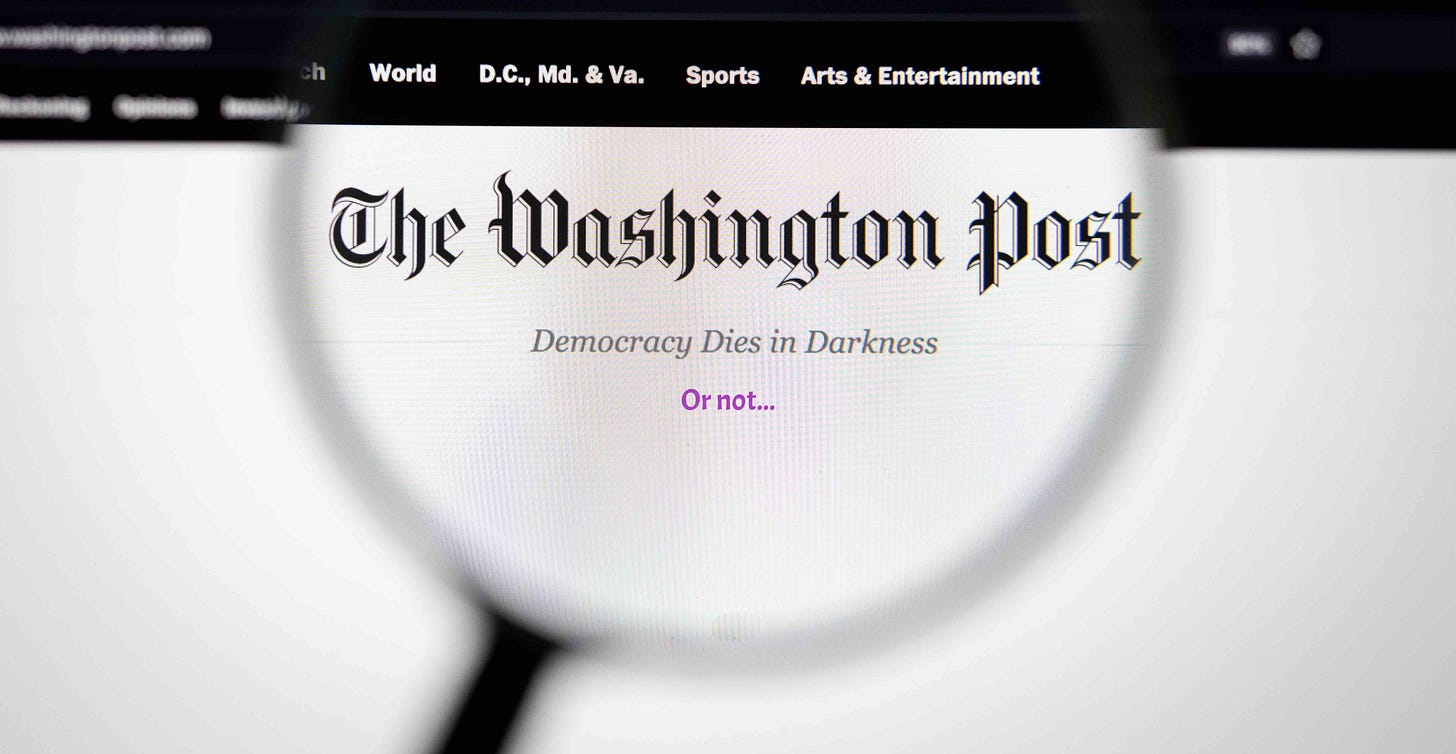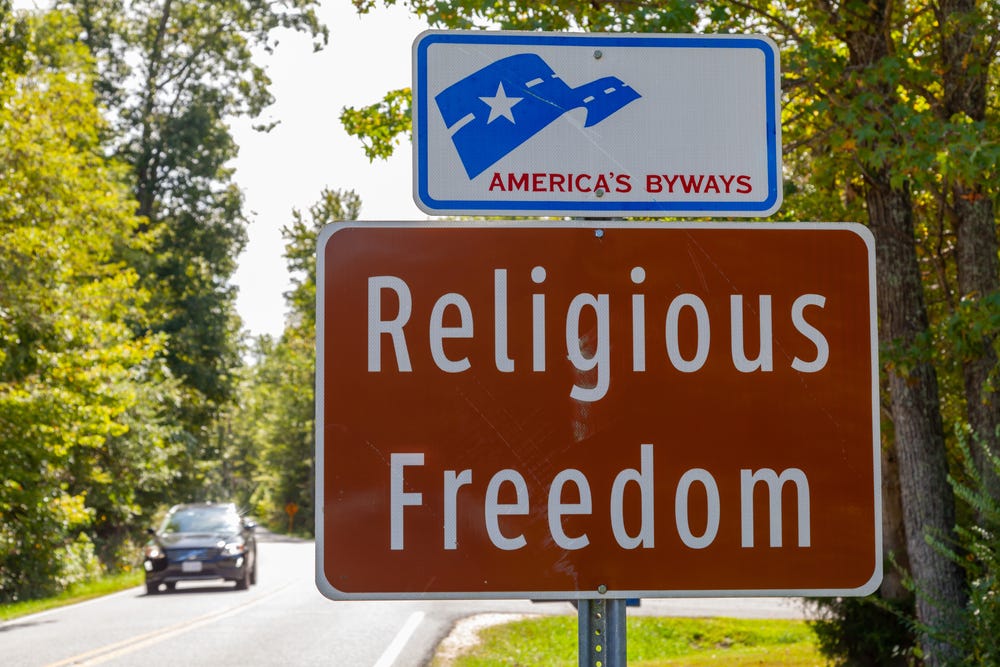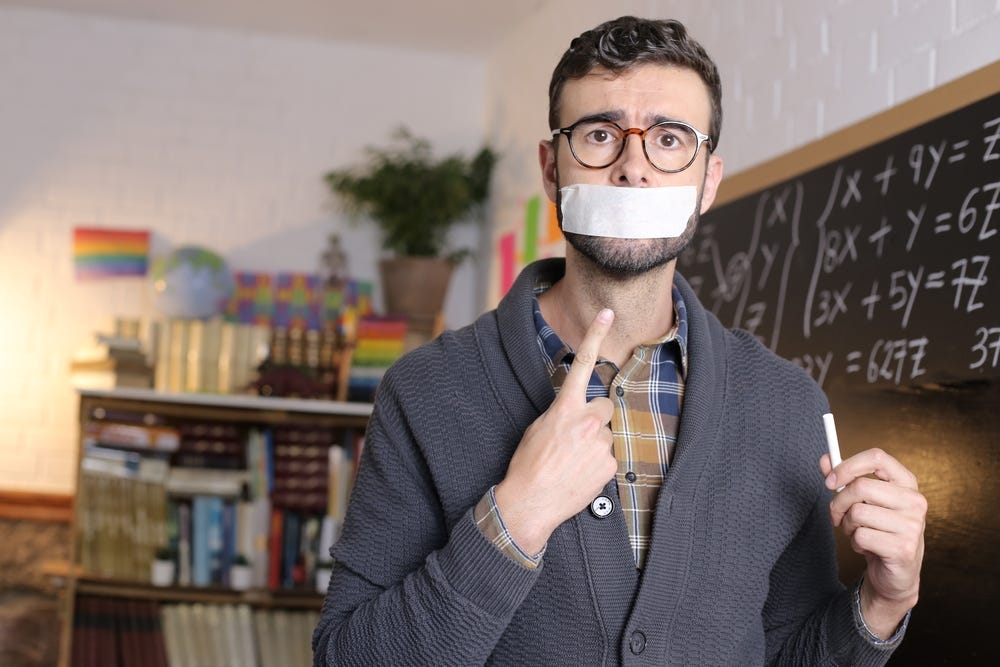E-Pluribus | August 28, 2023
Washington Post: A little darkness won't kill democracy after all; religious liberty at the state level; and an Ohio law school's persecution of its own professor.
A round-up of the latest and best writing and musings on the rise of illiberalism in the public discourse:
Jacob Sullum: The Washington Post Says Democracy Demands Less Freedom of Speech
Liking or agreeing with speech for its content or even accuracy cannot be the test of the First Amendment. Although social media companies are not the government, Jacob Sullum at Reason argues that the Washington Post has no business calling on Twitter (X), Facebook, and others to limit speech in the name of democracy.
The main conspiracy theory that [Washington Post reports] Nix and Ellison have in mind, of course, is the one claiming that systematic fraud, including deliberately corrupted voting machines and massive numbers of phony ballots, deprived Trump of his rightful victory in the 2020 election. As they note, neither Trump nor his lawyers ever produced any credible evidence to support that theory. Yet Trump, who currently is by far the leading contender for the 2024 Republican presidential nomination, still claims he actually won reelection, and the sincerity of that belief is a central issue in both the Georgia case and his federal prosecution for conspiring to make that fantasy a reality. As Nix and Ellison note, most Republican voters—63 percent, according to a CNN poll conducted in May—agree with Trump that Joe Biden "did not legitimately win enough votes to win the presidency."
As Nix and Ellison see it, none of those people should be allowed to express that view on social media. They also think it was clearly wrong for X to let Tucker Carlson post his recent interview with Trump, which was timed to coincide with the Republican presidential debate he skipped. "Trump capitalized on [Musk's] relaxed standards" in that interview, they complain, by reiterating his "false claims that the 2020 election was 'rigged' and that the Democrats had 'cheated' to elect Biden."
For me, that unilluminating, sycophantic interview, during which Carlson never asked a challenging question and let Trump ramble on about whatever random subjects flitted through his mind, was hard to watch. But as I write, it has racked up more than 256 million views, which suggests that more than a few people were interested in what Trump had to say. By comparison, Fox News says fewer than 13 million people watched its broadcast of the debate that Trump skipped.
X, in short, seems to be giving people what they want, which makes good business sense. One might also argue, as Carlson did, that "whatever you think of Trump…voters have an interest in hearing what he thinks," since he is the "indisputable, far-and-away front-runner in the Republican race."
Nix and Ellison do not see it that way. For the good of democracy, they think, social media platforms should be showing users political content only if it can be certified as accurate. That is, of course, an impossible challenge, one that is magnified by the difficulty of determining when speech, although not demonstrably false, nevertheless qualifies as "misinformation" because it is "misleading." Policing "hate speech," which Nix and Ellison also want the platforms to do, poses similar problems of interpretation and judgment.
Read it all.
Sarah M. Estelle: How States Can Protect Religious Liberty
Many of the original settlers of the New World came here for religious freedom. Today, however, many argue that religion is the low man on the totem pole when it comes to conflicting rights. At Discourse Magazine, Sarah Estelle gives the states some advice on how to better protect the rights of citizens to worship (or not) as they see fit.
For states that want to be proactive about ensuring their residents’ religious liberty, the best solution is for state and local governments to demonstrate their unwavering commitment to liberty, including the freedom to live according to one’s conscience. The most credible way to do this is by simply refraining from actions that encroach upon individual rights, thus allowing individuals and communities to freely and sincerely engage in religious practices in their daily lives.
In fact, by simply preserving private enterprise and respecting so-called negative liberty (especially by limiting the use of government’s coercive power), states can avoid the sometimes unpredictable and often widely dispersed burden of their laws without even focusing on religious liberty, per se. Upholding the fundamental right to liberty, even in the mundane case of ever-shrinking property rights (such as ownership of a wedding website), helps reduce the increasingly prevalent competing rights claims made in our pluralist society. In other words, safeguarding individual liberty both protects religious liberty and minimizes the occurrence of legal disputes and the need for controversial Supreme Court opinions.
In practice, though, states often pursue other objectives than safeguarding life and liberty, making the tradeoff between freedom and other perceived social goods. When these policies impose on individual liberty, as they often do, then the second-best strategy for protecting religious liberty is to carve out accommodations for religious exercise, broadly understood. The downside to this approach is that the carve-outs can appear to be unmerited religious privilege instead of an attempt to restore the liberty that belongs to everyone of any faith or of no religious belief at all. In this sense, accommodations of religious concerns don’t go too far; rather, they indicate where the freedom-protecting role of government has not gone far enough.
It also can be especially tempting to think of religious liberty as mostly a conservative, Christian concern. Christians historically have been the majority in the U.S. and, therefore, have been involved in shaping safeguarding laws in legislatures and courts. But it’s hard to find currently valid law on any state’s books that is explicitly limited to Christian applications. So the general legal protections of religion and conscience are broadly applicable to—and, one might imagine, especially important for—minority religionists. If community values and social norms are less effective for minorities than for more dominant religions, or if basic understanding is lacking, then such protections are even more valuable to minority religionists—as with laws that require public schools to excuse absences for all students’ religious observances, not just those that the school calendar has been formed around already.
State laws can protect religious minorities and avoid costly, potentially drawn-out legal battles. For example, when Zuri Wilson prepared to graduate from the Pearl Public School District in Mississippi earlier this year, she was initially told that she would not be permitted to wear traditional Cheyenne River Sioux Tribe regalia during commencement. However, because Mississippi statutory law requires that a “governmental entity may not prohibit an individual from wearing traditional tribal regalia or objects of cultural significance at a public event,” the school board reversed its decision. Because the state already protected this form of religious expression, this case never went to court, much less to the Supreme Court.
Read it all here.
Richard K. Vedder: The Ne Plus Ultra of Collegiate Wokeness
At times it seems like there’s a competition amongst American universities for Most Woke Institution. Writing for North Carolina’s James G. Martin Center for Academic Renewal, Richard Vedder would unhesitatingly award first prize to Ohio Northern University for its inexplicable treatment of its well-respected professor Scott Gerber.
Professor Gerber teaches in the ONU [Ohio Northern University] law school. U.S. News ranks ONU in the bottom one-third of Ohio’s law schools and as 146th best in the nation (Stanford is #1, Penn #4). The program is a back-up choice for students unable to get into Ohio State, Case Western Reserve, or the University of Cincinnati. It has almost nothing to brag about.
But there is one important legal scholar on the ONU law faculty—Gerber—and he is also a fine teacher. His book First Principles: The Jurisprudence of Clarence Thomas is a highly praised assessment of an important Supreme Court justice. He has authored eight other books and has given presentations at such prestigious institutions as Harvard, Stanford, Princeton, and Columbia.
[ . . . ]
Nevertheless, ONU is desperately trying to fire Gerber, although it hasn’t said why with any degree of clarity.
[ . . . ]
Gerber was not given any concrete reasons for his termination, other than his lack of “collegiality.”The most likely real reason ONU wants Gerber gone is that he is not “woke.” He has publicly said the university’s call for diversity does not mention intellectual or viewpoint diversity, and indeed Gerber has been told viewpoint diversity is not an objective at ONU.
Gerber believes students should hear alternative perspectives on issues of the day and then reach some conclusion—that ONU should be a marketplace of ideas rather than a monopolistic mouthpiece for a single perspective on issues, be they diversity, equity, and inclusion (DEI) obsessions or other, more substantive matters. It’s also worth noting that Gerber is on the Ohio advisory council of the U.S. Commission on Civil Rights.
ONU law school’s dean told Gerber to get lost, without any hearing, any due process, any opportunity to appear before an impartial panel, etc. That’s certainly in violation of ONU’s established procedures for evaluating tenured faculty alleged to have engaged in misconduct, and probably also the law. In legal wrangling since then, the Hardin County Common Pleas Court has had to constrain ONU at least temporarily from carrying out its plans.
The story is long and sordid, but the latest major act came when a student (!) informed Gerber that his constitutional law course for this fall would not be taught by him. The administration didn’t even have the decency to tell Gerber directly that he’s been stripped of courses he’s taught for years.
Read the whole thing.
Around Twitter
Via Free Black Thought, New York Times columnist Kwame Appiah on oversensitivity:
Are there limits on academic freedom? As far as the Foundation for Individual Rights & Expression is concerned, what states are trying on both the left and the right so far ain’t it. (click for video)
And finally, a UK man turns the tables on the pronoun police:









